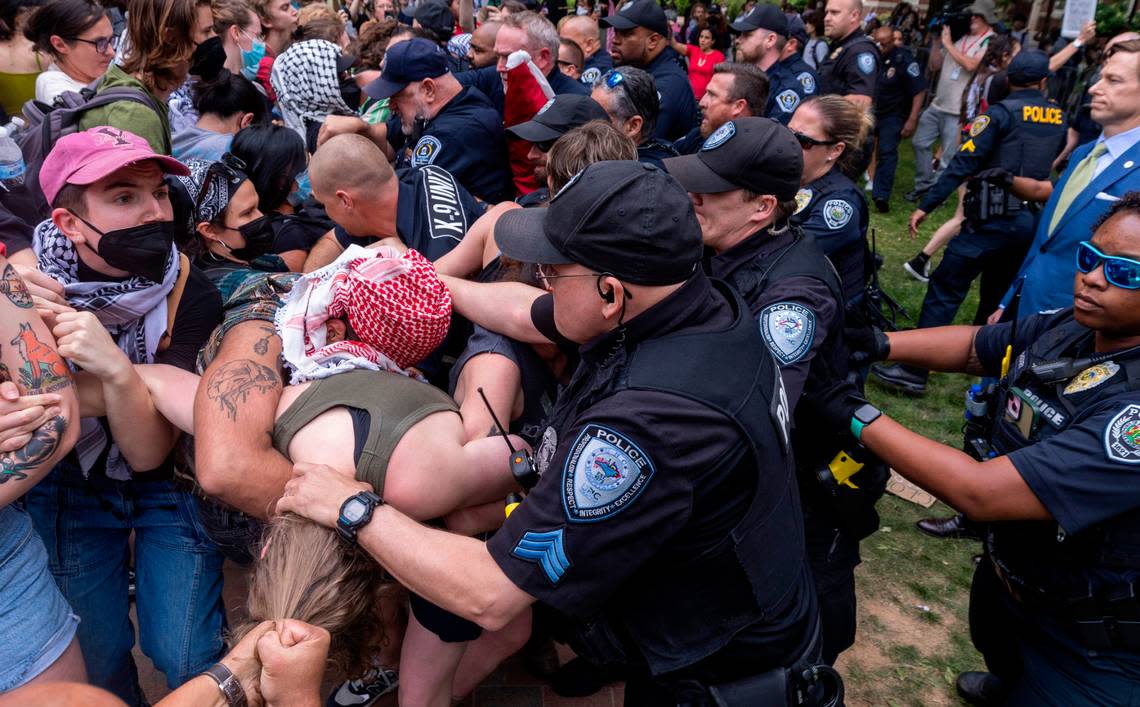NC House budget targets prosecutors who let protesters off ‘civil disorder’ charges
A provision tucked into the North Carolina House’s budget proposal would target prosecutors who dismiss criminal charges against protesters or allow them to plead guilty to lesser charges.
The new language would require prosecutors to provide detailed explanations for their reasoning if they dismiss a “civil disorder” case or allow the defendant to plead guilty to a lesser offense. Prosecutors would also have to share this explanation with the law enforcement agency that charged the defendant.
The law groups a variety of misdemeanors and felonies under the label of civil disorder, ranging from rioting to a misdemeanor for people who “make any rude or riotous noise, or be guilty of any disorderly conduct, in or near any public building or facility.”
Lorrin Freeman, the Wake County district attorney, said the legislature’s proposal could have a chilling effect on prosecutors who seek alternatives to prosecution, such as dismissals for low-level offenses in exchange for community service.
“It certainly would appear to signal that it is their intent that individuals who engage in these types of protest behaviors are prosecuted to the full extent,” she said.
At a committee meeting Tuesday, Republican Rep. Carson Smith, a former Pender County sheriff, said the provision would provide necessary accountability.
“The DAs will have the discretion,” he said. “But the public will know what’s happening to these folks.”
‘Frustration from law enforcement’
Freeman said that the Conference of District Attorneys was not notified about the proposed change. Representatives for the conference did not respond to a request for comment.
In recent years, Republicans across the country have railed against so-called “progressive prosecutors” for not pursuing harsher charges for a variety of offenses.
“We’ve heard a lot of frustration from law enforcement when they would go out to public disturbances that often involve violence and these cases were just — seemed to be dismissed willy-nilly,” House Speaker Tim Moore told reporters on Tuesday.
In North Carolina, Republicans voiced outrage at pro-Palestinian protests on UNC-Chapel Hill’s campus, with Moore saying participants who threw water at Chancellor Lee Roberts should be prosecuted and expelled.
Police charged 36 protesters from the Chapel Hill encampment with trespassing, The News & Observer reported. Some of them also face other charges, including assault on a government employee and resist, delay and obstruct.
Local officials in Chapel Hill and Carrboro faulted UNC police for escalating a peaceful protest, The N&O reported. They urged Orange-Chatham District Attorney Jeff Nieman to dismiss the charges “and to prioritize restorative justice rather than punitive measures.”
Nieman told The N&O he would look at each defendant’s situation “on a case-by-case basis,” including whether they had prior charges, “and we’ll do what we always do, which is evaluate whether or not we agree the law has been violated and it was properly enforced.”
“If so, we will prosecute the cases.”

The House’s budget proposal is unlikely to become law, as it comes in the midst of a standoff between Republican leaders in the House and Senate about how much of the state’s money should be spent.
What would the provision require prosecutors to do?
The language in the budget would apply to prosecutors dealing with a variety of charges that typically arise in protest or riot scenarios.
Some of the charges grouped under the “civil disorder” label include failing to disperse, blocking a roadway or inciting a riot.
Prosecutors who dismiss these charges or allow defendants to plead guilty to a lesser offense would be required to submit a detailed explanation for their decision.
The explanation would be required to contain a list of all the defendant’s prior convictions and “elements that the district attorney believes in good faith can be proved and a list of those elements that the district attorney cannot prove and why.”
It states that general explanations such as “interests of justice” or “insufficient evidence” are not sufficient to meet the requirements.
A copy of the explanation would then be sent to the head of the law enforcement agency that charged the defendant, as well as the prosecutor’s boss.
Similar explanations are required for prosecutors who dismiss driving while impaired charges, but Freeman said this is the first time she’s seen it put to use for other types of charges.
She said the language in the proposed budget “appears to suggest that dismissals are only appropriate where, for evidentiary reasons, you cannot prove the offense that has been charged.”
In Wake County, however, Freeman said that traditionally prosecutors have allowed first-time offenders for nonviolent civil disobedience charges to earn a dismissal of their charge in exchange for 25 hours of community service.
She worries that practices such as that could be discouraged if the new budget language is approved.
“It is concerning to me that it does certainly seem to invite or open up this area of scrutiny as to prosecutorial discretion that we have not heretofore seen,” Freeman said.
Tammy Grubb and Luciana Perez Uribe Guinassi contributed to this report.
